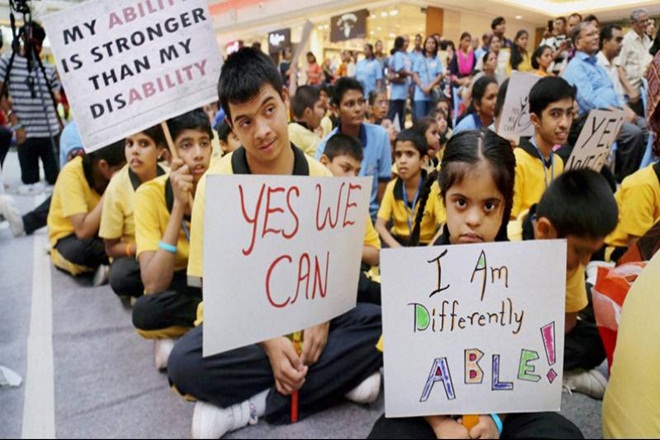
'Draft education policy neglects needs of disabled children'
Disability rights activists have come down heavily on the draft National Education Policy, criticising it for excluding the needs and rights of children with disabilities.

- 3/4ths of disabled children at five years of age and 1/4th between 5-19 years don't go to any school
- A large number of disabled children are enrolled in the National Institute of Open Schooling (NIOS)
- The number of disabled children enrolled in schools drops significantly at each successive level
- Enrolment is lowest for children with multiple disabilities and mental illnesses
- There are fewer disabled girls in schools than boys
Disability rights activists have come down heavily on the draft National Education Policy, criticising it for excluding the needs and rights of children with disabilities.
Pointing out that while access is claimed as the guiding principle, the draft itself is unavailable in accessible formats like audio formats or in Braille.
In a statement slamming the draft, Muralidharan, general secretary, National Platform for the Rights of the Disabled (NPRD), said, “Even the nodal ministry, the Ministry of Social Justice & Empowerment, the Department of Empowerment of Persons with Disabilities, the National Trust are all omitted from the list.”
He pointed that even the Rehabilitation Council of India, which is mandated to regulate and monitor services given to persons with disability, to standardise syllabi and to maintain a Central Rehabilitation Register of all qualified professionals and personnel working in the field of Rehabilitation and Special Education, does not figure in the list.
Omits conventions, rights
Overlooking both the United Nations Convention on Rights of Persons with Disabilities (UNCRPD) which India ratified and the Rights of Persons with Disabilities Act, 2016, the policy strangely talks of a non-existent Persons with Disabilities Act, 2005, he added.
Citing studies that reveal that only 22.4 per cent of schools have disabled-friendly toilets, and that in 20 per cent of schools where ramps are required, they are absent, the draft policy doesn’t address children with disabilities constituting almost 30 per cent of those out of school.
“The draft does not lay down any concrete measure to increase the enrolment of disabled children. On the contrary, the policy proposes to do away with the 25 per cent reservations for marginalised sections provided for in the Right to Education Act,” he observed.
What is the role of special schools?
However, the highlight of the draft’s indifference towards the section seems to be the omission of special schools and their role.
“The status of such schools, run mostly by NGOs, which are under the domain of the Ministry of Social Justice & Empowerment, is left unanswered. Whether they would be brought under the Ministry of Human Resource Development and guidelines framed for them is not spelt out in this draft,” the statement said.
The draft stresses on different models of education, depriving children with disabilities of quality education. As opposed to inculcating scientific temper, it will promote regressive ideas and superstitious beliefs.
The NPRD said the draft NEP violates the fundamental right to education including those of the disabled.
“Equality of outcomes, including those of the marginalised and disabled, is given a complete miss. It fails on all the three parameters — sab ka saath, sab ka vikas and sab ka vishwas,” he said.
Pointing out that special schools were having a free run with rampant commercialisation, activists also said that the lack of an exact database of children with disabilities is a challenge for the system.
TMN Deepak, founder of December 3 Movement, said the State Commission for the Protection of Child Rights should be coordinating with the Disability Department and in turn, the latter has to be working closely with the Social Defence Department. “However, neither of them do it, leaving the children with disabilities in a lurch.”
He said inclusive or special education for children with development disabilities is a tricky area, and no policy has been evolved so far by the Centre.


